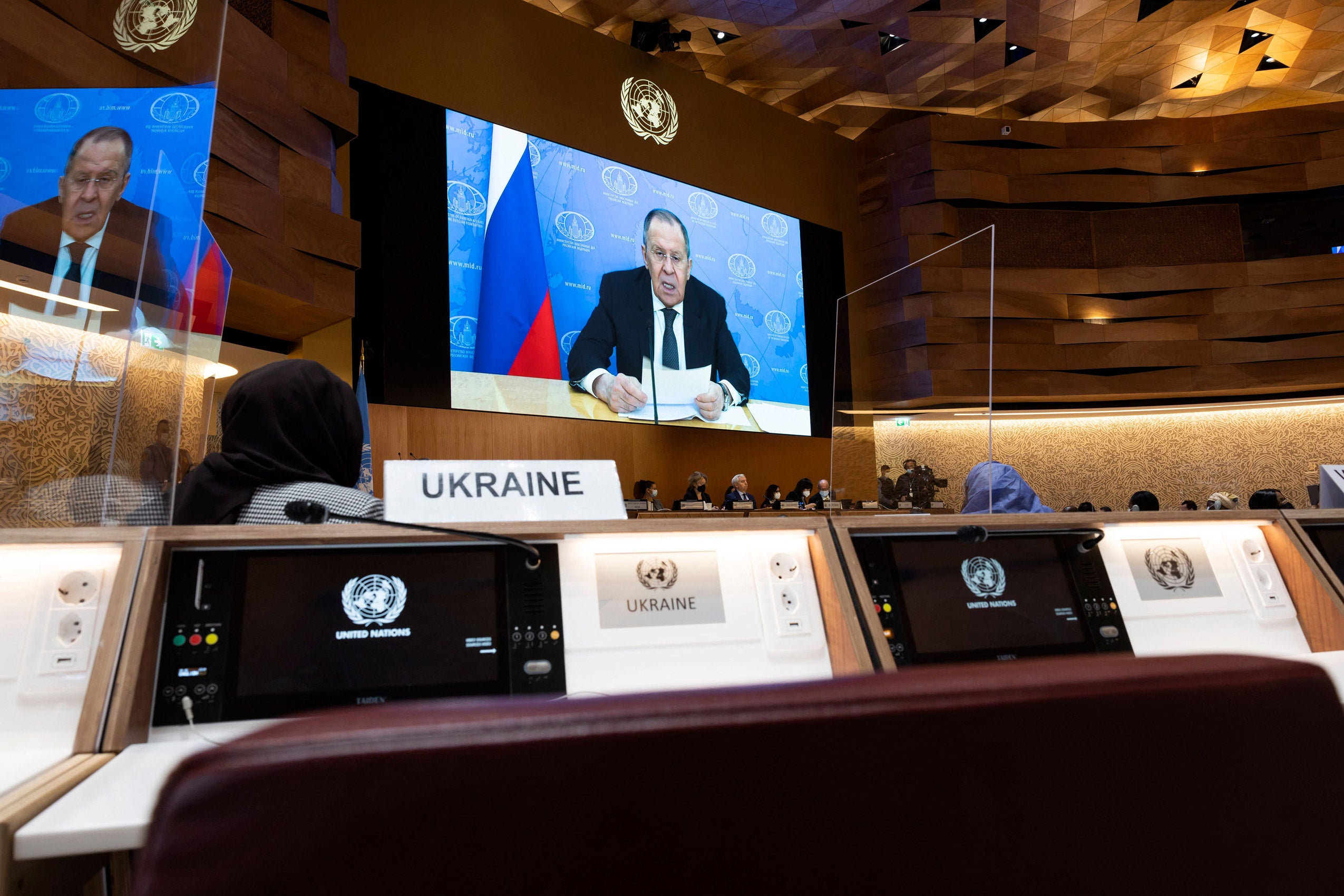Following a monthslong buildup of military forces along Ukraine’s borders, Russia launched a full-scale invasion of its western neighbor on Feb. 24. The attack came almost exactly eight years after Russia annexed Crimea. To understand the implications of these events under international law, Harvard Law Today reached out to Professors Gabriella Blum LL.M. ’01 S.J.D. ’03 and Naz K. Modirzadeh ’02 , both experts in the laws of war.
The faculty director and founding director, respectively, of the Harvard Law School Program on International Law and Armed Conflict, Blum and Modirzadeh explained via email that Russia’s assault is a clear violation of the United Nations Charter and that sanctions imposed by the United States and others are a legally permissible response. They also argued that, despite the failure of the U.N. Security Council to prevent the conflict in Ukraine, “this might be a moment for a renewed and more inclusive engagement around the legitimate interpretation of the international law that governs the use of force.”
Harvard Law Today: When is it permitted under international law for one country to invade a neighbor, and has Russia met that burden?
Gabriella Blum and Naz Modirzadeh: Countries’ sovereignty, political independence, and territorial integrity are widely recognized principles, enshrined in the United Nations Charter. There is a clear prohibition on the threat or use of force between states, other than as authorized by the Security Council or for purposes of the right of self-defense “if an armed attack occurs” (quoting the charter). A narrow understanding of anticipatory self-defense against an imminent armed attack has also been accepted by some international lawyers and policymakers as falling within the self-defense justification, as has a concept of protection of nationals abroad (for instance, in cases of hostage taking).
None of the justifications offered by President [Vladimir] Putin for the invasion of Ukraine — including protecting Russia from NATO’s eastern expansion or protection of ethnic Russians from alleged oppression by the Ukrainian government — could conceivably be understood as falling within the self-defense exception. No less problematic is Putin’s assertion that he is now coming to the aid of two republics in the Donbas region in eastern Ukraine that Russia has recognized as independent in recent days.

HLT: With respect to the Donbas region, what role does the will of the people in an affected nation or territory play in determining independent statehood, and how does that align with what is happening on the ground in Ukraine?
Blum and Modirzadeh: The right of peoples to self-determination is a fundamental right under international law. That means that any Russian ethnic minority in Ukraine has a right to determine its political status and pursue its economic, social, and cultural development. Yet, there is no right to unilaterally secede from a state and form a separate state. In recognition of states’ right to preserve their territorial integrity, secession is allowed only in extreme cases of repeated oppression or subjugation of the minority, leaving it with no other option to exercise “internal self-determination” in a meaningful way. International lawyers call this “remedial secession.” Putin seems to have alluded to this when he claimed that “[i]t was necessary to immediately stop this nightmare: the genocide against the millions of people living there, who rely only on Russia, hope only on us” — a claim that Ukraine emphatically denies.
There is much reason to suspect that Putin’s description of the situation in eastern Ukraine is a gross and self-serving exaggeration, if not an outright fabrication.
There is much reason to suspect that Putin’s description of the situation in eastern Ukraine is a gross and self-serving exaggeration, if not an outright fabrication. There have been some ongoing disputes over the use of the Russian language in official dealings and in schools. Even if language rights were denied or curtailed, this would hardly justify secession and would certainly not amount to genocide.
It is important to recall that this is the latest salvo in a repeated practice by Russia to recognize breakaway republics in areas over which it has territorial aspirations: In 2008, it recognized the Georgian regions of Abkhazia and South Ossetia as independent, and in 2014 it first recognized Crimea as independent and then annexed it. The fact that all these attempted secessions occurred after Russia had already intervened militarily in the region further weakens any claims for recognition of these areas as independent states.
HLT: Now that Russia has invaded Ukraine, what obligations do the parties have to prevent civilian casualties?
Blum and Modirzadeh: Both Russian and Ukrainian forces, as well as any other parties to the armed conflict, must abide by the laws of war, also known as international humanitarian law. These laws require belligerents to direct attacks only against able-bodied combatants and military objectives and to avoid or at least minimize harm to civilians, civilian objects, and the natural environment. Because Ukraine has accepted the jurisdiction of the International Criminal Court over the situation in Ukraine on an open-ended basis from February 20, 2014 onwards, the ICC would have the power to prosecute any war crimes, crimes against humanity, or crimes of genocide committed on any part of the territory of Ukraine. The ICC prosecutor has already started gathering initial evidence.
HLT: Generally speaking, when a nation violates international law, what legal recourse does the global community have? What role do the U.N and the U.N. Security Council play, and how effective have they been or can they be?
Blum and Modirzadeh: Ukraine has a right to defend itself against Russian aggression, as well as to request other members of the international community to come to its defense. It has been reported that several other countries have sent military aid to Ukraine in the form of munitions and defensive systems but not troops.
Short of the use of armed force, other countries may impose sanctions on Russia, including in trade, financial services, granting of visas, air travel, and more, subject to certain human-rights and related considerations.
International organizations could follow their procedures to expel Russia from their membership (Russia was expelled from the G-8 group following the annexation of Crimea and there are now calls to suspend Russia from the Council of Europe). States and international organizations can also seek to prohibit Russia from participating in cultural and sporting events.
Ukraine has a right to defend itself against Russian aggression, as well as to request other members of the international community to come to its defense.
The U.N. Security Council has the primary responsibility to maintain international peace and security. If it decides to take action against a member state, its decision would bind all 193 U.N. members. Such binding decisions are subject to veto by the five permanent members of the council, which includes Russia, and Russia blocked a council resolution over the weekend.
Because of its structure, the UNSC was often deadlocked throughout the Cold War and, again, in recent years. It has long been largely ineffectual with regard to incidents that implicate one or more of the P5 members, including the United States or Russia.
When the council is deadlocked, it is left to individual countries to make their own decisions about sanctions or other countermeasures. The General Assembly, which does not have the power to make binding resolutions, is holding a special emergency session to discuss the issue.
Finally, individual members of the Russian armed forces or their political leaders might face charges for crimes, including war crimes, in the International Criminal Court or in domestic courts in various countries.
HLT: With regard to the sanctions the U.S. and many other nations have imposed on Russia, what exactly is permitted under international law? What about sanctions that cripple another nation’s economy in ways that impact innocent civilians?
Blum and Modirzadeh: Sanctions imposed by one state against another are generally considered a permissible “countermeasure” — that is, a tit-for-tat to a prior violation of international law by a state. The country imposing the countermeasure must intend to induce the violating state to stop the breach. The Security Council may order the imposition of sanctions, but, of course, the Russian veto disables the Security Council from serving this role.
Even the best-intentioned sanctions often end up having detrimental humanitarian consequences as they incapacitate national economies or make the delivery of essential services and humanitarian aid more difficult. In recent decades, there have been efforts to tailor sanctions more narrowly to target particular individuals or institutions, but there is no denying that the greater the sanctions in number and scope, the worse for the general population.
Such sanctions, though effectively a form of collective punishment of the population, are lawful under international law as long as the sanctions themselves do not constitute violations of international human rights law.
HLT: Ultimately, how relevant is international law, particularly if the means for enforcing it are limited and depend on the willingness of the global community?
Blum and Modirzadeh: No system of laws can be measured only in reference to violations. We could never know, for instance, how many more acts of violence or atrocities would have been committed had there not been a system of international law. It is noteworthy that both Putin and his opponents have repeatedly resorted to international law in support of their respective claims. As of March 1, for instance, dozens of states have condemned Russia’s blatant violations of international law at the General Assembly in a special emergency session.
Also noteworthy is Putin’s reference to purported violations of international law by the United States and its NATO allies. In a lengthy speech justifying the invasion, Putin derided the U.S. and NATO for their military intervention in Kosovo, the invasion of Iraq (ridiculing the American claims about their intelligence), the overly expansive and disingenuous interpretation and application of a Security Council resolution on Libya and the consequent collapse of the country, as well as the ongoing attacks in Syria. “In general,” asserted Putin, “one gets the impression that practically everywhere … the West comes to establish its own order, the result is bloody, unhealed wounds, ulcers of international terrorism and extremism.”
While legally, these arguments would carry little weight in any court of law (even if true, one illegal use of force does not justify another), they may prove powerful in the court of public opinion.
One conclusion then might be that international law has proven generally ineffectual when it comes to checking great powers’ actions. Another might be that it is in the interest of every member of the international community — including great powers — to adhere to a system of rules, even when there are short-term incentives to defect. In fact, this might be a moment for a renewed and more inclusive engagement around the legitimate interpretation of the international law that governs the use of force.
